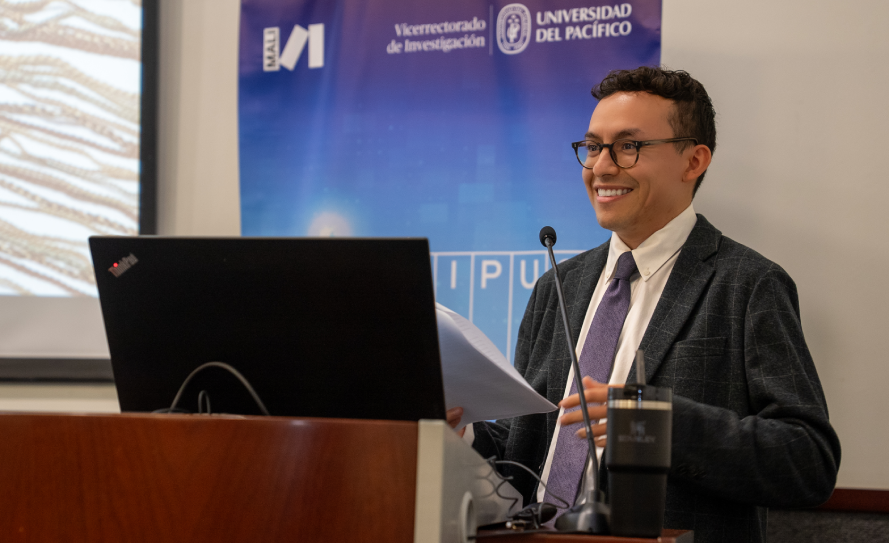Organized by the School of Engineering, Khipus Week 2025 turned Universidad del Pacífico into a space for dialogue between history and technology. On September 24, the central day of activities, the Khipus Project was presented—an initiative that integrates science, the humanities, and technology to decipher these enigmatic Andean recording systems. International specialists shared recent findings and innovative approaches on the cultural value and historical relevance of khipus, reaffirming their importance for research and education in Peru and worldwide.
.png)
A Project That Merges Science, Technology, and Culture
The Khipus Project is based on the Radicati Collection of khipus, currently housed at the Museo de Arte de Lima (MALI). This interdisciplinary effort, the result of collaboration between the humanities and engineering, aims to expand knowledge about khipus and open new possibilities for research and connection with the Andean past.
Cecilia Pardo, professor of Digital Humanities at UP and researcher at CIUP, highlighted the project’s importance:
“Khipus are not just material objects; they are also a language and a system of knowledge. The Khipus Project opens a unique horizon because it combines cultural tradition with cutting-edge technological tools, allowing us to understand the complexity of Andean civilization more deeply.”
.png)
Keynote Lectures: Voices That Decode the Past
The conference on September 24 began with a presentation by Cecilia Pardo, who offered a historical and cultural perspective on khipus, emphasizing their value as living heritage and a key to Andean memory. She explained the project’s background and underlined the importance of the Radicati Collection as the central axis of the research.
Next, Juan Lazo, professor in the Department of Engineering and researcher at CIUP, addressed the technical challenges involved in building 3D computer models of khipus, which allow the digital recreation of catalogued specimens. This methodology contributes to their preservation and facilitates their study by research teams around the world without handling the original pieces.
“Each khipu is an unrepeatable document; recording them properly not only protects them but also enables comparison and the discovery of connections that enrich our understanding of Andean society."
.png)
Manuel Medrano, researcher at Harvard University, explored how digital technology offers new opportunities to advance in deciphering these systems, explaining how the use of big data and computational techniques helps reveal patterns invisible to the human eye:
“Technology multiplies our reading capacity. We detect invisible regularities that give us new clues about how information was organized in pre-Hispanic Andes.”

Finally, Sabine Hyland, anthropologist from the University of St. Andrews, focused on the social and community dimension of khipus as instruments of communication and cohesion:
“We are facing a communal technology that reflects relationships of trust, collective memory, and social organization. Studying them connects us with the bonds that sustained Andean communities for centuries.”
At the end of the talks, a public discussion was held, reinforcing the academic and cultural character of the event. Together, the presentations offered a diverse and complementary overview of khipus, establishing the Khipus Project as an international benchmark at the intersection of science, technology, and culture.
.png)
A Week of Dialogue and Discovery
Khipus Week 2025 included workshops, discussions, and academic visits that brought students and specialists closer to the study of khipus from multiple perspectives. These activities promoted interdisciplinary learning and emphasized the importance of integrating traditional knowledge with technological innovation.
Luciano Stucchi, Dean of the School of Engineering, highlighted the impact of such initiatives:
“Projects led by our faculty strengthen our research capacity and position engineering as a bridge between science, the humanities, and technology. They also allow our students to engage in real projects, learn from interdisciplinary research, and understand how engineering can help address cultural and social challenges.”
.png)
Khipus Week and the presentation of the Khipus Project establish Universidad del Pacífico as a reference in Andean heritage research and its diffusion through technological innovation. This initiative positions the institution within the global debate on the cultural legacy of the Andes, reaffirming its commitment to academic excellence, interdisciplinary research, and national development—integrating knowledge, culture, and technology in service to society.